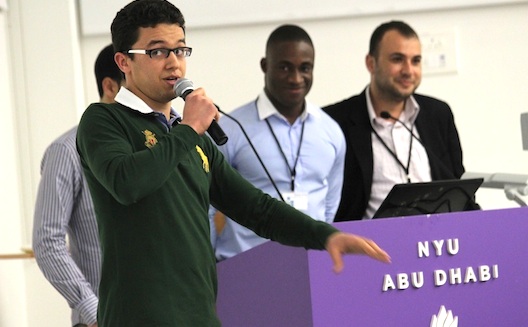Building a Hacker Culture in Abu Dhabi

 For three days inside New York
University Abu Dhabi’s purple campus in the Emirati capital,
delegates from universities in sixteen countries programmed
socially minded apps at the second NYUAD Hackathon For Social Good
in the Arab World, the brainchild of the university’s computer
science professor Sana Odeh.
For three days inside New York
University Abu Dhabi’s purple campus in the Emirati capital,
delegates from universities in sixteen countries programmed
socially minded apps at the second NYUAD Hackathon For Social Good
in the Arab World, the brainchild of the university’s computer
science professor Sana Odeh.
Eighty students were coached by 30 mentors during the program
(academics and professionals from Google, Microsoft, NASA, among
others), which culminated in an evening pitch to the panel of
twenty judges.
The winning team, Take Flight, offered a video chatting platform
mediated by a translator. The group’s lead emcee Seth Thompson, a
Yale graduate, spoke with the practiced patter of a TED Talk
lecturer, understanding that presentation is half the battle for
creative enterprise.
In second place, Safe Journey designed a system of text message
alerts to monitor the user’s progress along a route, functioning
like an avalanche beacon in case of emergency. (For more on the 16
teams that competed, see Shaimaa Nazer's summary of the event).
Odeh’s enthusiasm for the UAE-based Safe Journey team bubbled
over. “They found a bug in Google Android,” she said.
And their app, should the many moving pieces come together, will
contribute one ingredient to social improvement.
Bringing Communities Together
The program’s initiative towards Social Good was
twofold: first, to address pressing public issues, and second, to
unite and support young communities of Arab and Western
programmers.
“When I came here, we were all in Lost Land, not doing anything,”
said Odeh, who began organizing the first Hackathon two years ago
with almost manic intensity. And the cultural divide between
the expatriate community and the Middle East, she found, was wider
than she had expected.
Odeh feels that her job, energy permitting, is to foster
connections and encourage young programmers to follow through.
Access to mentorship and the principles of ask-for-what-you-want
entrepreneurship are stronger in the United States than they are
yet in the Arab World, she says. “[Students] here typically don’t
have the experience [of self-promotion], but if we build this
culture that’s what will happen.”
The first step for entrepreneurs is a commitment to the product,
says Odeh. These students are already eloquent in lines of Python,
Java, HTML5 — the Hackathon’s goal is getting their apps to have
the greatest effect. “What is so beautiful about this is that
people are driven by the product itself,” she says.
Building a Hacker Tradition
It remains to be seen how many of the sixteen international teams
will follow through with their creations. Although the winning
teams from 2011 no longer have an online presence, Taher Zanouda, a
former participant from Algeria, went on to win third prize at the
Azure Challenge (part of Microsoft’s ImagineCup). Zanouda
returned this year and joined the Laha team, who presented an
online platform for Arab women to cope with the experience of
chronic diseases.
For those committed beyond the perfection of their apps alone, the
hope is that they will provide open source content to the global
community of “hackers,” or find a route to monetize. The
event was not focused merely on the precedents set by Twitter,
Facebook or Google, which addressed revenue only years after
building a global userbase.
But with the Hackathon’s focus on providing mentorship, Odeh
expects this newly connected community of young programmers will
take flight, transitioning from student to social entrepreneur for
good.


